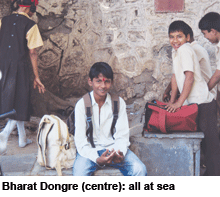 Bharat (10), a class v student and one of two children of Vinayak Dongre, a Pune-based scrap seller (annual income: Rs.90,000) residing in the city’s Parvati slums, has been attending a Pune Municipal Corporation (PMC) school for the past six years. However, ask him to complete a simple sum, especially subtraction, and he is all at sea. His father, who has been sending him to school for six years incurring expenditure of Rs.6,000-8,000 per year, feels the boy is wasting time and money attending school. “He would do better to assist me,” he says.
Bharat (10), a class v student and one of two children of Vinayak Dongre, a Pune-based scrap seller (annual income: Rs.90,000) residing in the city’s Parvati slums, has been attending a Pune Municipal Corporation (PMC) school for the past six years. However, ask him to complete a simple sum, especially subtraction, and he is all at sea. His father, who has been sending him to school for six years incurring expenditure of Rs.6,000-8,000 per year, feels the boy is wasting time and money attending school. “He would do better to assist me,” he says.
The Dongre family’s is not an isolated case. Such is the deplorable state of education in the 299 primary (classes I-VII) schools run by the Pune Municipal Corporation’s Municipal School Educ-ation Board (MSEB), and attended by 110,000 students, that it is contributing to — rather than eradicating — illiteracy.
This dismal conclusion is confirmed by a survey conducted by Action for Rights of the Child (ARC), an NGO offering remedial education to slum children who have completed classes III-IV in PMC primaries. The ARC survey indicates that over 75 percent of children in classes III-IV cannot negotiate basic subtraction sums involving two digit numbers; 92 percent of them cannot manage a simple division sum and that over 47 percent of girls and 53 percent of boy children cannot read and narrate a short story written in their native Marathi. Some of them even fail to recognise the Devanagari script.
The month-long survey was conducted by ARC — an umbrella organisation of several child rights advocacy groups in the city — and covered students who don’t receive any homework or learning assistance except in school. The 850 students tested included 214 girls who have passed class III, 214 girls who have completed class IV and 206 boys from classes III and IV. “We chose PMC school students from a wide cross-section of slums in Pune and were amazed to find that learning outcomes of all were pathetic,” says ARC coordinator, Nakul Kate.
According to Kate, the ARC survey required class III-IV students to recognise basic alphabets and words, single and double digit numbers, read out small paragraphs, followed by a small story and complete simple subtraction and division sums. A test which required the sample students to read a simple paragraph wasn’t completed by 38 percent girls and 37 percent boys, while 47 percent girls and 53 percent boys of equal academic level couldn’t read and narrate a short story in Marathi.
“Moreover 38 percent of girls and 37 percent boys couldn’t recognise two digit numbers. Unsurprisingly, as many as 72 percent of girl students and 77 percent boys couldn’t subtract, while 92 percent of boys and girls couldn’t divide a three digit sum by a single digit number,” says Kate, adding that the ARC survey has been submitted to MSEB.
Predictably the damning ARC survey aroused scant indignation in the media or within the academic community of Pune, which posits itself as the academic hub of Maharashtra, the country’s most industrial state (pop.112 million). In fact, there was hardly any response to news items published in Pune’s English and Marathi dailies. Like Vinayak Dongre, most citizens of this industrial city seem to have given up on PMC schools.
Shantaram Deshmukh, a former principal of Adarsh Vidyalaya, a PMC school, explains the poor learning outcomes of PMC primaries by citing the low competence of teachers, lack of resources, poor pay and infrastructure and total lack of interest among students. “These schools are being run ritually. There is no grand mission to educate children coming from impo-verished backgrounds. The usual reason cited for their poor condition is lack of funds,” says Deshmukh.
Confronted with the conclusions of the ARC survey, Ramchandra Jadhav, administrative officer of MSEB, is unperturbed. “We have studied the report and are in the process of formul-ating an action plan. We will shortly hold a meeting with the headmasters of all PMC schools to discuss the findings of this report so that an improvement programme can be worked out,” he informed your correspondent.
Put that down as another typically bureaucratic response — full of assurance and empty on implementation.
Huned Contractor (Pune)